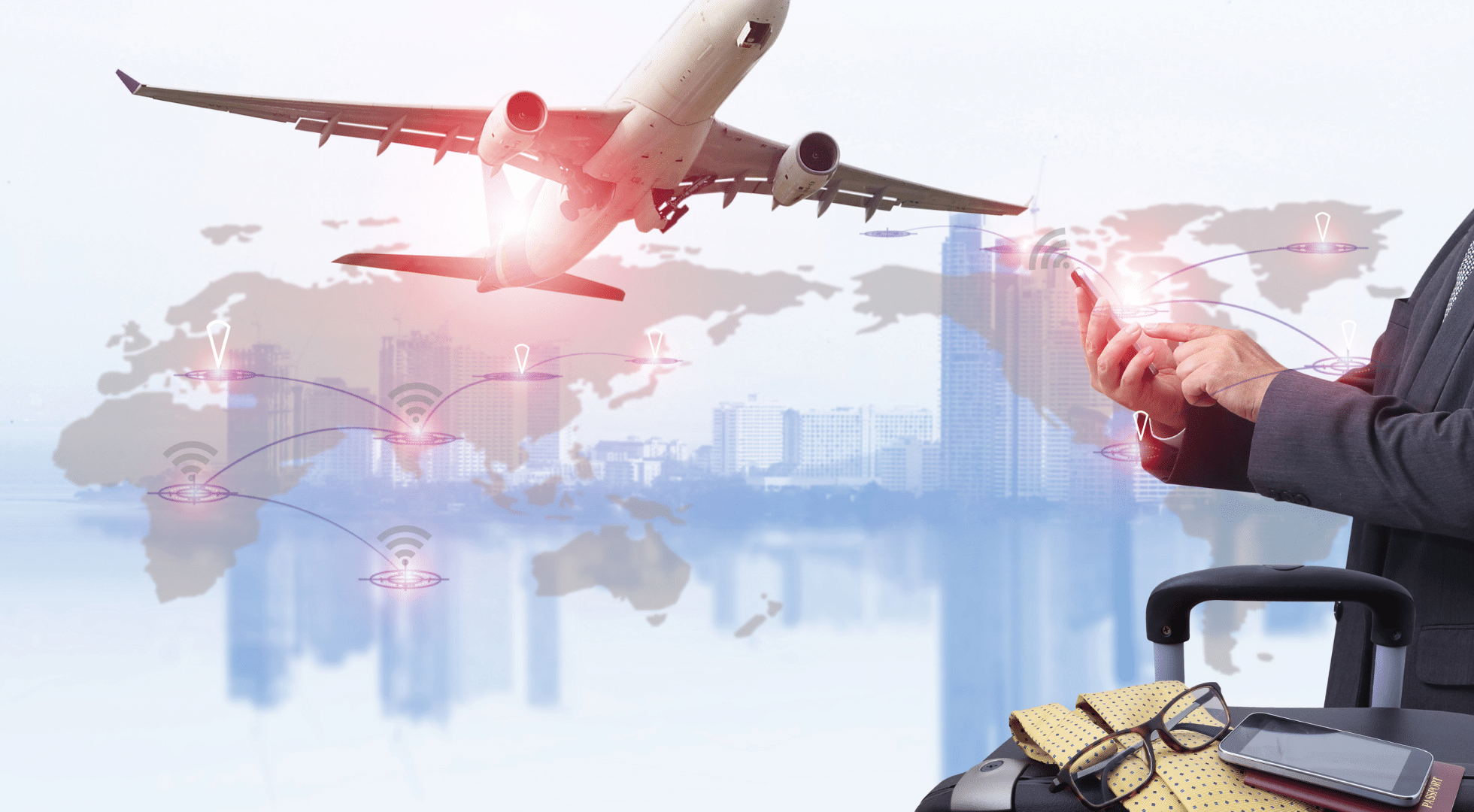Despite the convenience and effectiveness of online technologies like Zoom for virtual communication, the significance of business travel remains undeniable. Companies that understand the crucial role of business travel often enjoy a multitude of benefits it brings. To further maximise these benefits, the types of business traveller that the company sends also makes a difference.

Each type of business travel, whether it’s attending conferences, meeting clients, or exploring new markets, offers its unique advantages. However, these benefits can be further amplified by implementing managed travel solutions.
By efficiently managing travel expenses, optimising travel itineraries, and leveraging negotiated rates, companies can enhance the cost-effectiveness of their business travel endeavours. In doing so, they not only maximise the return on investment but also ensure that their travel budgets are utilised strategically to support their business objectives.
What is the importance of business travel?
Business travel is a cornerstone of many companies’ operations, but what drives them to send their employees on these trips? Here are several reasons why companies invest in business travel:
1. Closing deals
In the realm of business negotiations, closing deals requires more than just exchanging proposals and counteroffers—it demands a personal touch that can only be achieved through face-to-face interactions.
Despite the prevalence of virtual communication tools, the value of meeting in person cannot be overstated. These encounters foster trust, empathy, and a deeper understanding of each party’s needs and motivations. As such, business travel remains an essential strategy for companies aiming to secure agreements and cultivate long-lasting partnerships.
2. Market expansion
When companies set their sights on new markets, sending representatives to explore unfamiliar territories becomes essential. These excursions offer firsthand insights into the intricacies of local dynamics, from consumer behaviour to regulatory landscapes and cultural nuances.

3. Relationship building
Business travel serves as a catalyst for strengthening relationships with clients, partners, and colleagues, offering unparalleled opportunities for meaningful interactions. While digital communication tools provide convenience, they often fall short in fostering the trust and rapport established through face-to-face meetings.
In-person interactions enable individuals to pick up on subtle cues and nuances, fostering a deeper understanding of each other’s needs and aspirations. This deeper connection not only enhances the quality of service and products delivered but also facilitates smoother resolution of any concerns or issues that may arise.
By investing in business travel, companies prioritise the cultivation of strong, enduring relationships that form the bedrock of sustained success in today’s interconnected business landscape.
4. Networking opportunities
Embarking on business travel to attend industry events, trade shows, and conferences opens doors to valuable networking opportunities, trend exploration, and relationship building.
Networking serves as a vital avenue for establishing connections, acquiring new clients or partners, and staying informed about industry trends and practices. For instance, participation in trade shows offers a platform to showcase products or services, engage with potential clients, and gain insights into emerging market trends.
By embracing business travel, companies broaden their professional networks, fortify relationships, and remain at the forefront of industry advancements, positioning themselves for continued success and growth.
5. Competitive advantage
In today’s digital age, where virtual communication reigns supreme, companies that prioritise business travel gain a notable competitive advantage. While digital platforms offer convenience, they often lack the depth and authenticity that can only be achieved through face-to-face interactions. By investing in travel and engaging in personal meetings with clients and partners, companies can establish genuine connections and foster trust in ways that virtual communication simply cannot replicate.
These in-person interactions provide invaluable opportunities to truly understand the needs and aspirations of clients and partners, allowing companies to tailor their offerings and services accordingly. Moreover, the personal touch of face-to-face meetings often leads to stronger relationships, paving the way for increased collaboration, loyalty, and mutual success.
Ultimately, companies that embrace business travel are better positioned to seize opportunities, navigate challenges, and stay ahead of the competition in today’s dynamic business landscape. By harnessing the power of face-to-face communication, they not only enhance their reputation and credibility but also unlock new avenues for growth and innovation.
What is the purpose of business travel?
1. Exhibition and trade shows
Attending exhibitions and trade shows presents an excellent opportunity to showcase products and connect with potential customers, whether in a different region or abroad. Additionally, these events provide insights into competitors’ offerings and facilitate networking within the industry.
Exhibitions often feature groundbreaking products and services, making them ideal venues for conducting business face-to-face. This direct engagement allows for asking questions and establishing relationships with vendors.
Furthermore, the small investment in sending employees to trade shows can yield substantial returns, particularly in industries where early trend identification is critical, such as technology, healthcare, or finance.
2. Conferences and meetings
Consider attending a meeting or conference pertinent to your business or industry if it offers growth or networking prospects.
As travel returns to pre-pandemic norms, many organisations will resume their annual industry conferences or company meetings. Such events serve as vital occasions for employees from various branches or regional offices to convene in person.
Particularly for remote employees who primarily engage with colleagues and supervisors virtually, a centrally-located annual meeting presents an ideal opportunity to foster stronger connections among coworkers.
3. Corporate events
Corporate events encompass a wide array of gatherings, such as meet-and-greets, business-to-business meetings, and exclusive employee gatherings. Beyond merely bringing people together, these events serve as platforms for networking, marketing, and face-to-face interactions with peers.
Additionally, they often include instructional training sessions, providing valuable learning opportunities for attendees.
4. Incentive travel
Incentive travel, often sponsored by employers to incentivize employees to reach certain goals, offers more than just a rewarding trip to an enticing destination. It serves as a powerful motivator, fostering loyalty among employees and providing them with a well-deserved break from workplace pressures.
Over time, travel programs can yield a significant return on investment (ROI) as relationships with hotels and other vendors develop. Moreover, these programs contribute to reducing costs associated with employee recruitment and turnover by incentivizing the retention of top-performing employees.
5. Team building activities
To reap the fullest benefits from team building activities, they must be dynamic and captivating. Employees are unlikely to fully engage in ways that benefit your business unless the activities are truly compelling. Incorporating travel into team building events can elevate them to a new level of excitement and effectiveness.
Contrary to common assumptions, popular team-building destinations can be surprisingly affordable, particularly when leveraging the group rates available to business customers.
6. Bleisure travel
Bleisure travel, a trend on the rise, involves adding leisure time to a business trip. It offers business travellers the chance to extend their stay in a new destination and explore its attractions without incurring the full costs of a separate vacation.

5 types of business traveller
1. The frugal traveller
This segment of travellers is driven by the desire to save company funds. Thrifty travellers actively seek out economical flight options and budget-friendly accommodations. They often opt for cost-efficient meal options and are mindful of expenditure limits, treating company funds with the same care as their own.
Key points:
- Thrifty travellers may operate without clear budgetary guidelines but still strive to make responsible choices.
- Despite uncertainties, this group demonstrates a strong acceptance of the necessity of expense reports for efficient business operations.
2. The policy-abiding traveller
The policy-abiding traveller represents the majority among business travellers, strictly following company travel guidelines. They opt for preferred airlines, stay in approved corporate hotels, and meticulously adhere to meal per diems.
Key points:
- Policy-abiding travellers are inclined to use online tools like Concur for expense management, indicating a preference for streamlined processes.
- They are more likely to be aware of budget constraints and ensure spending remains within limits, underscoring the importance of clear policies and budget transparency in maintaining fiscal discipline.
3. The results-driven traveller
The results-oriented traveller, comprising a notable portion of business travellers, prioritises task completion above all else. They are willing to invest in more expensive flights or last-minute accommodations if it helps achieve their objectives.
Key points:
- They often opt for manual filing of expense reports and perceive the process as time-consuming, suggesting potential challenges in managing discretionary spending effectively.
- This group tends to incur additional expenses, such as rideshare services, music subscriptions, meal deliveries, and Amazon purchases, without full disclosure.
4. The perk-seeking traveller
The perk-seeking traveller, is a significant group of business travellers that prioritise personal comfort and enjoyment during work-related trips. They aim to indulge in quality dining, luxurious accommodations, and upgrades whenever possible, often opting for convenience over cost.

- This group is more inclined to view expense reports as a waste of time or fail to see their purpose, indicating a reluctance to engage in meticulous financial reporting.
- Perk-seeking travellers are also more likely to operate without clear budgetary guidelines and spend freely as needed, potentially leading to budgetary oversights.
5. The rule-breaker traveller
The rule-breaker traveller is a minority within business travellers who prioritise achieving sales targets and goals above strict adherence to company policies. While they may deviate from established guidelines, they believe their actions are justified by their performance outcomes.
Key points:
- A significant portion of these travellers are not mandated to submit expense reports. However, among those who do, they are more likely to find the process time-consuming.
- Rule-breaker travellers are nearly twice as likely not to conform to budgetary constraints, spending as required to achieve their objectives without strict adherence to budget guidelines.
Manage business travel efficiently with Holiday Tours
Managing a business trip involves juggling numerous factors, from transportation and accommodations to group arrangements and security measures. Streamlining these processes is essential for optimising costs and ensuring smooth operations while adhering to company policies.
At Holiday Tours, we specialise in comprehensive solutions for business travel needs. With our expertise, you can seamlessly handle every aspect of your business travels. From implementing company policies to controlling costs and optimising processes, we streamline it all, ensuring a hassle-free experience for your company.
STREAMLINE YOUR BUSINESS TRIPS.
REACH OUT TO US AT +603 2303 9100 (Press 3) OR [email protected]
You may also be interested in:
